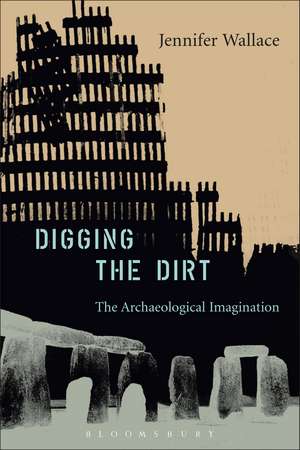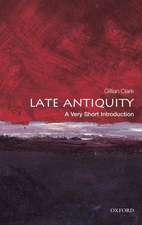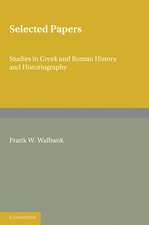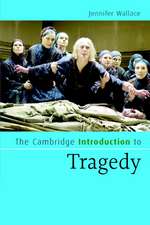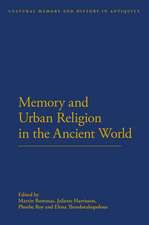Digging the Dirt: The Archaeological Imagination
Autor Jennifer Wallaceen Limba Engleză Paperback – 24 iun 2004
Preț: 172.90 lei
Preț vechi: 199.82 lei
-13% Nou
Puncte Express: 259
Preț estimativ în valută:
33.09€ • 35.38$ • 27.59£
33.09€ • 35.38$ • 27.59£
Carte tipărită la comandă
Livrare economică 18 aprilie-02 mai
Preluare comenzi: 021 569.72.76
Specificații
ISBN-13: 9780715632789
ISBN-10: 0715632787
Pagini: 192
Ilustrații: 16 b&w plates
Dimensiuni: 156 x 234 x 18 mm
Greutate: 0.37 kg
Editura: Bloomsbury Publishing
Colecția Bristol Classical Press
Locul publicării:London, United Kingdom
ISBN-10: 0715632787
Pagini: 192
Ilustrații: 16 b&w plates
Dimensiuni: 156 x 234 x 18 mm
Greutate: 0.37 kg
Editura: Bloomsbury Publishing
Colecția Bristol Classical Press
Locul publicării:London, United Kingdom
Caracteristici
Positive reviews: e.g. "A fascinating progression through hearty parsonical barrow-diggers, body-snatchers, philosophers, savants, and poets - from Shelley and Wordsworth to Seamus Heaney" (Sunday Telegraph)
Notă biografică
Jennifer Wallace is Lecturer in English Literature, and a Fellow of Peterhouse College, University of Cambridge. UK. She is the author of Shelley and Greece: Rethinking Romantic Hellenism (1997), Lives of the Great Romantics: Keats (1997), and joint editor of Consuming Passions: Food in the Age of Anxiety (1998).
Cuprins
List of Plates 1. The Poetics of Depth 2. Romancing Stones: The Archaeological Landscape 3. Unearthing Bodies: The Disruption of Hisyory 4. Fulfilling Desires: Erotic Excavation 5. Fundamentalism: Digging our Trojan Origins 6. Rock Bottom: Digging and Despair 7. Holy Ground: Archaeology and the Sacred8. Postmodern Archaeology: Trashing Our Future Notes on Reading Acknowledgements Index
Recenzii
Digging the Dirt is an original foray into some of the reasons why archaeology fascinates us ... A fascinating progression through hearty parsonical barrow-diggers, body-snatchers, philosophers, savants, and poets - from Shelley and Wordsworth to Seamus Heaney ... The book is a fresh and engaging tussle with archaeology and the imagination.
Wallace engages in an extended literary treatment of archaeology. This attachment to archaeology built up in her in her travels to different places around the world where she explored archaeological sites real and reputed. With her literary temperament, she sees archaeology as involving a "poetics of depth." Not so much concerned with the discipline and deductions of archaeology, Wallace sees, and feels, it as a desire to uncover the millennial secrets of human nature and as a countervailing activity to the centrifugal tendencies of the postmodern world. Beginning her book with an anecdote about Schliemann--who discovered the site of ancient Troy--believing that the face of a buried warrior he came upon was that of the king Agamemnon only to have the face disintegrate upon being exposed to the air, Wallace writes of the romance of archaeology as it has affected noted and unknown archaeologists, writers, and artists, and also herself. Digging the Dirt makes good reading for Wallace's literary style, and for its occasional lucid notes of social critique implicit in the author's romantic view of archaeology.
As a compulsion it is modern: Jennifer Wallace, in her profound and fascinating new book, Digging the Dirt, locates its beginnings in figures such as William Stukeley, whose lively, some said fantastic, explorations of Avebury and Stonehenge in the early 18th century began the work of fleshing out our remote ancestors.
The business of digging things up cannot help but be an imaginative enterprise as much as a scientific one.
Wallace engages in an extended literary treatment of archaeology. This attachment to archaeology built up in her in her travels to different places around the world where she explored archaeological sites real and reputed. With her literary temperament, she sees archaeology as involving a "poetics of depth." Not so much concerned with the discipline and deductions of archaeology, Wallace sees, and feels, it as a desire to uncover the millennial secrets of human nature and as a countervailing activity to the centrifugal tendencies of the postmodern world. Beginning her book with an anecdote about Schliemann--who discovered the site of ancient Troy--believing that the face of a buried warrior he came upon was that of the king Agamemnon only to have the face disintegrate upon being exposed to the air, Wallace writes of the romance of archaeology as it has affected noted and unknown archaeologists, writers, and artists, and also herself. Digging the Dirt makes good reading for Wallace's literary style, and for its occasional lucid notes of social critique implicit in the author's romantic view of archaeology.
As a compulsion it is modern: Jennifer Wallace, in her profound and fascinating new book, Digging the Dirt, locates its beginnings in figures such as William Stukeley, whose lively, some said fantastic, explorations of Avebury and Stonehenge in the early 18th century began the work of fleshing out our remote ancestors.
The business of digging things up cannot help but be an imaginative enterprise as much as a scientific one.
Descriere
When Jennifer Wallace travelled round Greece as a student, hiking through olive groves to hunt out the stones of old temples and lost cities, she became fascinated by archaeology. It was magical. It was absurd. Give an archaeologist a few rocks and, like a master storyteller, he could bring another world to life.
